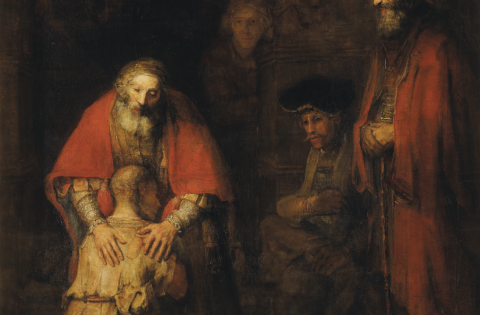
Image by Cody Doevendans
Sometimes when I read a quote, I’m stunned at how accurate it is in terms of my own journey. This was the case when I read that theologian Martin Buber once wrote, “All journeys have secret destinations of which the traveler is unaware.”
When I graduated with my doctorate in psychology, I expected that I’d see patients, make rounds at a hospital, and teach. All of that happened. However, what I didn’t envision was being called upon as an expert on the prevention of secondary stress (the pressures experienced in reaching out to others). I ended up writing and speaking in twenty countries to priests, vowed religious, physicians and nurses, NGOs/relief workers, and other mental health professionals on self-care, the integration of psychology and spirituality, enhancing your own sense of resilience, and understanding the dynamics of being compassionate in ways that you don’t burn yourself out.
Through these teaching opportunities, I came to understand two essential principles that are especially important in today’s sometimes dark and challenging times. The first occurred when I was asked to speak in South Africa after Apartheid had ended and the helpers and healers were doing their best to renew the people. I finished my first presentation and a woman came up to me and said, “I just can’t do it anymore.”
I asked her what she did for work, and she replied, “I’m a social worker and I aid women who have been physically and emotionally abused. They want justice, so I go with them to the courts. This is difficult for them because they are so poor and often single parents, so they are in a bad position to take a day off from work. But they want justice, so they do it.”
“All journeys have secret destinations of which the traveler is unaware.”
She continued: “When we finally get to see the judge, who is often male, he sometimes glances at the papers in front of him and says, ‘I haven’t had a chance to look at this yet. Make another appointment.’ When this happens, I know I am a failure…a total failure!”
I was quiet for a few moments because she was so upset and I needed to let the emotion in her settle. But then I asked, “Who is with the woman in the room other than you, while you wait for the judge?”
Surprised, she replied, “No one.”
Then I asked, “Would it be an exaggeration to say that you were closer to her during those moments than anyone else in the world?”
She responded, “No, it wouldn’t.”
I asked, “And you want to leave doing that?” And while she was absorbing that question, I went on: “Don’t you realize, the spiritual concern of those of us who wish to be compassionate is not ‘success’…it is faithfulness.”
Each of us has a calling from God. When we focus on responding to it, and seeking to deepening our mission, this is the goal. Knowing this within helps us to avoid the stress and burnout of focusing solely on “success.”
The second story comes from my work in Cambodia, where I was asked to speak to those trying to help the Khmer people rebuild their country after years of terror and torture. At a break, after speaking on enhancing resilience, a Buddhist nun came up to me and said, “Doctor, do you have a moment?”
“For you Sister, of course I have,” I said.
She related to me a story about a young Buddhist they’d assigned as chaplain to the hospital ward, responsible for the care of farmers who had their legs blown off by landmines. She noted that in doing this ministry, the young man was becoming depressed himself. Then she asked, “What can I do to help him?”
Being compassionate is like a circle of grace, in which we receive as well as share with others.
I replied, “If you would tell me a bit about what comes up in the meditation he undergoes in his car after work, before he returns to the temple, I could give a more helpful answer.”
Her face turned pale as she said, “I am embarrassed, doctor. I am a Buddhist nun, and I never thought to bring up meditation with him.”
Being compassionate is like a circle of grace, in which we receive as well as share with others. But to be a constant healing presence to those who need our listening ear, and have a willingness to walk through the darkness with someone, we need to be centered ourselves. One of the greatest gifts we can share with others is our own inner peace and resilience—but we can’t share what we don’t have.
My purpose in sharing these two stories is to make the point that to be a constant helping presence we need to focus on faithfulness (a spiritual virtue), not success (a worldly obsession), and we need to take out time in silence and solitude while wrapped in gratitude to God for the gifts we have been given. We sometimes tell ourselves that there’s no time for this, but actually we always have time for what we truly value.
We often let quiet, contemplative time take a back seat in our schedule because quieting ourselves sometimes leads us into unhelpful mental cul de sacs. One of these is arrogance, where we project the blame for things on others—which is fun to do, but if we give away the blame, we also give away the power to learn and change. The second is ignorance, where we blame ourselves. When we do this, meditation and contemplation turn out to simply be times to beat ourselves up—but this does no good, and behavior that we wince at eventually turns into behavior we wink at because we can’t tolerate constantly picking on ourselves. The third common mistake in quiet prayer is discouragement, which is the last home of the ego. Instead, we must seek a spirit of intrigue, as to what we are being asked, at each stage of life, to learn about ourselves, and to determine who we are being called to be at different stages, so that we can share the true person we are with others, which is a core calling of the Gospels.
By being faithful to the process of helping others, continually learning about ourselves in the process, and being open to mature in our self-awareness, the simple care of a hopeful heart will occur. And isn’t that beautiful?












